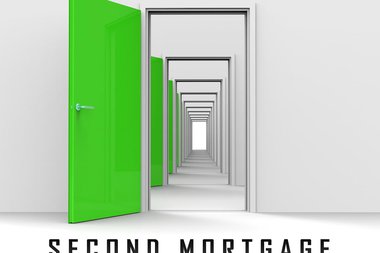Second Mortgage And Third Mortgage
Whether You Need $20,000, $500,000, Or $5,000,000 Clover Mortgage Is Your Best Alternative To A Bank!

Second Mortgage
What is a second mortgage?
A second mortgage is typically a short-term interest-only mortgage loan that is secured against the available equity in your home or commercial property as collateral. This type of mortgage loan goes behind a first mortgage in second position, hence the name, second mortgages.
What is a second mortgage and how does it work?
Since a second mortgage ranks lower in authority than a first mortgage loan, the second mortgage lender takes on a great risk since in the event of a power of sale, the first mortgage lender must get paid out first followed by the second mortgage lender. The added risk comes in the form of a shortfall should there not be enough money left over after the first lender gets paid out. In this case, the second mortgage lender might not recuperate their full principal investment. In some cases, lenders of second mortgages they may not recuperate any amount of the initial principal loan amount that is loaned out to the borrower. In more extreme instances, the private lender might even find themselves further out of pocket should they incur legal fees and additional costs that are involved with a power of sale. This is why the search for the right second mortgage lender is critical to ensure that you get the best mortgage rates and terms that are available to you.
As a result of the added risks of these kinds of loans to the investors and lenders, for the most part, only private lenders are willing to lend on a second mortgages. Because mainly private mortgage lenders will lend on these loans, the interest rates for second mortgages are usually fixed rates and tend to be higher than private mortgages in first position, and significantly higher than the rates that you would see at a bank. Though with some lenders variable interest rates are available if requested. There are also typically additional lender fees, broker fees, and legal services fees associated with taking out a second mortgage. However, in most cases these fees can be rolled up into the loan amount so that the borrower does not need to pay for the fees upfront and be out of pocket.
Also, since most second mortgage payments are interest-only, the overall monthly payment might end up being quite reasonable. When this type of mortgage is taken out in order to consolidate debt that have higher interest rates attached with them, the monthly payments on second mortgages can be significantly lower than the total monthly debt payments on credit card loans, and other expensive loans and past due bills. At least now you might stand a better chance at paying down some of your high interest debts, though it is very important to do a cost vs savings analyses prior to committing to any type of debt consolidation loan solution. We all know that carrying continuous debt on your credit cards can really hurt your financial situation.
This information in the following sections will provide you a strong foundation of education to help you better understand the benefits and nuances of getting a second mortgage.
Mortgage Affordability Calculator
How does a second mortgage work when it comes to qualifying?
When it comes to qualifying for a second mortgage or any private mortgage loan, the process tends to be much simpler and everything generally works quicker than when qualifying for a mortgage with a bank or other more regular and traditional lending institution. Since private mortgage lenders primarily lend on the available equity, location, quality and marketability of the house or commercial property, there is usually much less weight placed on a borrower’s credit score, credit history, and income. Therefore, there typically needs to be much less documentation provided by the homeowner or commercial property owner. Since the private mortgage world is much less regulated, lenders are able to set their own lending criteria for the most part. However, it is important for mortgage agents and mortgage brokers to ensure on their end that a borrower earns enough income to be able to afford their current and new mortgage payments.
Since the approval process is much easier and faster, in some cases you can get approved for a second mortgage in as little as an hour or a day. In certain situations, if everything is in order, a good mortgage broker is able to get the funds in as little as 24 hours to 48 hours in the event of a quick short closing.
In some more unique home purchase cases, second mortgages can at times become a more complex topic. In some situations, the buyer who is buying the house might not have enough money to close on the mortgage and they may require a second mortgage to help with the purchase. It’s important that you understand that not all first mortgage lenders will allow for a second mortgage behind them. In fact, most of the major banks will not allow secondary financing when you’re buying a home and getting a mortgage through them. This is why proper mortgage planning is necessary to ensure that you have the funds needed to close on your home.
If you are purchasing with less than an 80% down payment and working with an institutional lender, you will be required to qualify for mortgage default insurance. Even though none of the mortgage default insurance companies have any restrictions when it comes to secondary financing on the property, the AAA bank style lenders typically do.
It’s also good to know that high-ratio mortgage insurance is not available on second mortgage loans.
What documents do I need for a second mortgage?
As mentioned above, you will be required to provide less documents in order to get approved for a second mortgage with a private lender. Here are the more commonly asked for documents that are often needed to put together applications for second mortgages:
- Two pieces of identification.
- A recent appraisal of the property by a reputable appraisal company.
- A recent mortgage statement or mortgage statements for your home or property showing the balance remaining, interest rate, and term remaining on any existing mortgages and home equity line of credits that are secured by the subject property. Lenders need to confirm any existing mortgage and equity line balances tied to the property.
- A recent property tax bill showing the amount of annual property taxes that is attached with the property and showing any outstanding property tax arrears.
- A recent credit report will be required, although many private lenders do not place a great deal of consideration on the borrower’s credit rating.
- Your most recent Notice of Assessment (NOA) showing what you declared on the line 150 and stating if any money is owed to the government for income tax. In certain situations, some private mortgage lenders will approve someone who hasn’t filled taxes in many years, but the rate and fees might be higher.
- Recent 3 to 6 months of bank statements with your name and home address displayed showing that you can afford to pay the interest on the loan portion of any second mortgages that you take out.
Depending on the specifics of your situation, some lenders might require less documents from you for approving second mortgages, while others might ask for additional documents not listed above.
Second mortgages in Ontario
Although similarities do exist between provinces across Canada when it comes to getting second mortgages, there are certain guidelines, regulations, and qualification criteria that are specific to getting approved for second mortgages in Ontario, Canada.
How can you qualify for a second mortgage?
Qualifying for a second mortgage is much easier than qualifying for a loan from the bank, provided that you have enough equity available in your commercial property or in your home. Since lending guidelines and regulations differ from province to province, we will focus on the qualification requirements for a second mortgage in Ontario.
To qualify for second mortgages in Ontario, the process can be quite simple and straightforward. Since the majority of private mortgages are given to borrowers by private lenders and individual investors, much less importance is placed on the borrower’s income and creditworthiness. Since the most important factor to private mortgage lenders is the actual asset itself that will be used as collateral to secure their loan, they mainly care about the available equity and loan to value (LTV). Where the property is located, the condition and overall marketability also play major roles in their decision-making process.
Other types of second mortgage lenders include Mortgage Investment Corporations (MIC’s), private mortgage funds, and in some situations, institutional alternative mortgage lenders, also commonly known as “B” lenders in Ontario. In the case of these more regulated and institutional mortgage lenders, the process to apply for a second mortgage in Toronto or other areas across Ontario can require a minimum credit score and provable income showing the borrower's ability to make the mortgage payments. As a result, these lenders tend to offer better rates and terms, but would typically require more documents from the borrower prior to approving and funding any mortgage loan. With these lenders it can be slightly more challenging for borrowers to be able to qualify.
How much can be borrowed with a second mortgage?
Depending on how much equity is available in the property, you can borrow as much as you want provided you have enough available home equity. The general second mortgage loan for a residential home ranges from as low as $30,000 to as high as $2,000,000, but we’ve brokered second mortgage loans in the millions, and have seen them go well beyond $10,000,000 and more. In the case of commercial mortgages, second mortgages can even be in the hundreds of millions of dollars.
Second mortgages in Toronto and other parts of Ontario, along with private mortgage lenders in Toronto and across the province, are not regulated extensively, and they do not have to limit the amount that a borrower can borrow. That’s to say that they are not regulated in the same way that institutional lenders such as banks, trust companies, credit unions, and even MIC’s and mortgage funds are, there is not actual limit to how much a second mortgage lender can lend on a property. For the most part, a second mortgage in Ontario will not exceed a total LTV of greater than 80%, though in some cases we have seen second mortgage lenders lend up to a higher LTV %.
The total LTV which is also known as the Loan-to-Value of the property is the combination of all current remaining mortgage balances (first mortgage + any second mortgage + any third mortgage + etc.) added to any additional equity that is being taken out with the new mortgage. You would then add any current balances owing on any lines of credit that are secured against the property, such as a home equity line of credit or a commercial lines of credit tied to a commercial real estate property. You then take the sum of all secured debts tied to the property and divide that by the current value of the property and multiply that amount by 100. This will give you the new LTV %.
For example:
A property in Toronto valued at $1,000,000 has a current first mortgage balance of $500,000. The homeowner needs to take a second mortgage in the amount of $200,000 to complete extensive renovations on the home and put in a swimming pool in the backyard.
The new LTV% = (Current first mortgage balance + second mortgage amount) / current property value X 100
New LTV% = ($500,000 + $200,000) / $1,000,000 x 100
New LTV% = $700,000 / $1,000,000 x 100
New LTV % = 70%
In this example the new loan to value would be 70% after taking into consideration the new second mortgage amount.
What is the difference between a home equity loan and a second mortgage?
With regards to the difference between a home equity loan and a second mortgage, we need to first explore in more detail what a home equity loan is. A home equity loan uses equity that is available in your home as collateral security for a lender who will lend you money in a lump sum. This type of loan can come in a few different forms including a second mortgage, a third mortgage, an increased refinance of a first mortgage, and a home equity line of credit commonly referred to as a HELOC or home line plan. Some HELOC’s might come with a lower rate than a second mortgage, but in other cases second mortgages might provide the better rate for you.
Essentially a home equity loan refers to virtually any loan where a borrower takes out funds against the equity remaining on their property, including second mortgages.
A second mortgage specifically, as explained earlier in this page, is essentially a home equity loan that goes in second position behind a first mortgage.
How much are closing costs on a second mortgage?
Since a second mortgage carries more risk to the private mortgage lenders and investors, there are additional fees typically associated with taking out this type of loan. These costs can include Lender Fees that the mortgage lender will retain for themselves in addition to the monthly interest that they collect. Borrowers can also expect to pay a brokerage fee since the vast majority of private lenders, almost all, do not pay anything to the mortgage broker who worked to find the lender, provide the borrower with the right education about second mortgage, and who arranged the mortgage for the borrower. In addition to these two fees, the borrower will also be looking to pay for both the lender’s legal fees, and the borrower’s own legal fees to obtain independent legal representation. In certain instances, only if the second mortgage amount is less than $50,000, the lender might agree to allowing their lawyer to also represent the borrower in order to save costs for the borrower.
The amount and percentage of the Lender Fee and Broker Fee depend on several factors such as the loan-to-value, the location and condition of the property, the amount and size of the second mortgage loan, the amount of time and work that the mortgage broker put into the specific application, and more. In some cases, more so with institutional second mortgage lenders, the borrower’s credit and income might play a role in determining the fees that the private lender and mortgage brokerage might charge.
Here are three charts that are each based on different LTV ranges outlining some of the more common interest rates, monthly mortgage payments, lender fees and broker fees starting ranges for different amounts and sizes of mortgages. These should help you compare and better understand the different rates and fees that can be associate with second mortgage.
Up to 65% LTV Second Mortgage Rates and Costs
| 2nd Mortgage Amount | Interest Rates (Average Range) | Monthly Payments (Interest Only) | Lender Fee (Starting at)* | Broker Fee (Starting at)* |
|---|---|---|---|---|
| $50,000 | 5.99% to 8.99%** | $250/month to $375/month | Starting at 1.5%* | Starting at 1.5%* |
| $100,000 | 5.99% to 8.99%** | $500/month to $750/month | Starting at 1.5%* | Starting at 1.5%* |
| $250,000 | 5.99% to 8.99%*** | $1,250/month to $1,850/month | Starting at 1%* | Starting at 1%* |
| $500,000 | 5.99% to 8.99%*** | $2,500/month to $3,700/month | Starting at 1%* | Starting at 1%* |
| $1,000,000 | 5.99% to 8.99%*** | $5,000/month to $7,400/month | Starting at 1%* | Starting at 1%* |
| $2,000,000 | 5.99% to 10.99%**** | $10,000/month to $18,317/month | Starting at 1%* | Starting at 1%* |
| $5,000,000 | 5.99% to 12.99%**** | $25,000/month to $54,125/month | Starting at 1%* | Starting at 1%* |
Up to 80% LTV Second Mortgage Rates and Costs
| 2nd Mortgage Amount | Interest Rates (Average Range) | Monthly Payments (Interest Only) | Lender Fee (Starting at)* | Broker Fee (Starting at)* |
|---|---|---|---|---|
| $50,000 | 7.99% to 11.99%** | $333/month to $500/month | Starting at 2%* | Starting at 2%* |
| $100,000 | 7.99% to 11.99%** | $666/month to $1,000/month | Starting at 2%* | Starting at 2%* |
| $250,000 | 7.99% to 11.99%** | $1,665/month to $2,500/month | Starting at 2%* | Starting at 2%* |
| $500,000 | 7.99% to 11.99%** | $3,330 /month to $5,000/month | Starting at 2%* | Starting at 2%* |
| $1,000,000 | 7.99% to 11.99%** | $6,660/month to $10,000/month | Starting at 2%* | Starting at 2%* |
| $2,000,000 | 8.99% to 13.99%*** | $14,984/month to $23,316/month | Starting at 1.5%* | Starting at 1.5%* |
| $5,000,000 | 8.99% to 13.99%*** | $37,460/month to $58,292 /month | Starting at 1.5%* | Starting at 1.5%* |
Up to 80% LTV Second Mortgage Rates and Costs
| 2nd Mortgage Amount | Interest Rates (Average Range) | Monthly Payments (Interest Only) | Lender Fee (Starting at)* | Broker Fee (Starting at)* |
|---|---|---|---|---|
| $50,000 | 12.99% to 16.99%** | $542/month to $708/month | Starting at 4%* | Starting at 4%* |
| $100,000 | 12.99% to 16.99%** | $1,084/month to $1,416/month | Starting at 4%* | Starting at 4%* |
| $250,000 | 12.99% to 16.99%** | $2,710/month to $3,540/month | Starting at 4%* | Starting at 4%* |
| $500,000 | 12.99% to 16.99%** | $5,420/month to $7,080/month | Starting at 4%* | Starting at 4%* |
| $1,000,000 | 12.99% to 16.99%*** | $10,840/month to $14,160/month | Starting at 5%* | Starting at 5%* |
| $2,000,000 | 13.99% to 18.99%**** | $21,680/month to $28,320/month | Starting at 5%* | Starting at 5%* |
| $5,000,000 | 13.99% to 18.99%**** | $54,200/month to $70,800/month | Starting at 5%* | Starting at 5%* |
Best Second Mortgage Rates in Ontario
When it comes to getting the best second mortgage rates in Ontario, private lenders such as MIC’s (Mortgage Investment Corporations), mortgage funds, and institutional alternative lenders (B lenders) would provide the lowest second mortgage interest rates, but typically require a slightly more involved qualification process which places great weight on the homeowner’s credit history and income. This is why a private lender who is an individual investor would approve and finance a second mortgage loan with less stringent qualifying requirements, but that does tend to come without the low second mortgage rates that are offered by MIC’s, funds, and B lenders.
Many of these lenders may not deal with the public directly and may only be accessible through a mortgage broker. For the most part, the lenders that are accessible directly to you do not always tend to provide enough education to help you make an informed decision prior to signing their mortgage commitment.
It is important to keep in mind that since most second mortgages are interest-only loans, the monthly payments are often times comparable to those that would come with a more traditional amortized first mortgage from a more conventional bank.
Examples of MIC’s include CMI (Canadian Mortgages Inc.) and Fisgard. An example of a mortgage fund would be companies such as OWEMANCO (Ontario Wealth Management Corporation) and Firm Capital, and Clifton Blake Capital. With regards to institutional alternative lenders, this list includes B lenders such as Home Trust Company, Community Trust, and Haventree Bank. Although these lenders will sometimes go way outside of major city centres, their best rates on second mortgages would be for second mortgages in Toronto, Mississauga, Oakville, Vaughan, Richmond Hill, Guelph, Kitchener, Ajax, Pickering, Oshawa, Barrie, Newmarket, Maple, Woodbridge, Thornhill, Cambridge, London Ontario, Kingston, King City, Windsor, Ottawa, and other larger city centres.
Below is a simple chart showing some examples of the best second mortgage rates and examples of lenders who might offer them. It is important to note that the best second mortgage rates do depend party on the location of the property and its proximity to larger cities such as Toronto.
Best second mortgage rates in Ontario:
| Lender Type | Example of Second Mortgage Lender Company | Product | Interest Rate* | Minimum Credit Score | Maximum Loan-to-Value* |
|---|---|---|---|---|---|
| MIC (Mortgage Investment Corporation) | CMI (Canadian Mortgages Inc.) | Second Mortgage | 5.99%* | 400 | 80%** |
| Mortgage Fund | Sequence Capital | Second Mortgage | 6.99%* | 500 | 80%** |
| Trust Company (Institutional Lender) | Community Trust | HELOC (Home Equity Line of Credit) In 2nd position | 6.49%* | 580 | 65%** |
| Individual Private Lenders | Individual Investor | Second Mortgage | 7.99* | No minimum credit score | 80%** |
What are the benefits of second mortgages?
There are many benefits that can be associated with refinancing and taking out a second mortgage. In the case of taking out second mortgages on properties for the purpose of using them as a form of debt consolidation loan, the borrower can be saving thousands, and in some cases tens of thousands of dollars a year on interest costs and monthly debt payments with the right consolidation loan.
Let’s say that you have accumulated $100,000 in combined personal credit card debt because you live in an expensive city like Toronto and use credit cards to collect points that you can later use for a variety of things. You decide to borrow a second mortgage to pay off your credit cards and consolidate all of the monthly payments into one single smaller monthly payment. Let’s say that the average interest rate on your credit cards is 20% (which is in fact a common interest rate on many credit cards out there). At a fixed 20% interest, you would be paying $20,000 in interest a year if you carried the full $100,000 balance for the year. Your minimum monthly payment would likely be approximately 2% of the balance each month (interest + a little bit of principal) which would be $2,000 a month. At this rate it would take you over 9 years to pay off the $100,000 at that rate, provided that you do not spend an extra dollar on credit cards.
If we take that same $100,000 and turn it into a 2nd mortgage, then you can be paying as little as 5.99%* a year with approximately 2.5% in lender fees and 2.5% in broker fees paid upfront or deducted from the loan advance. This is assuming that you have significant amount of equity available in your home and that it is located in a good area or more populated city like Toronto, or even smaller cities like Kitchener, London Ontario, Cambridge, Kingston, Barrie, and other similarly populated spots. In this scenario, your monthly payments would be $499.17 each month, which is $1,500 less than is you were making your minimum monthly credit card payments. If you put that extra $1,500 towards paying off the principal amount of $100,000, then you would be able to pay it off in as little as 5 years and 7 months. You’d be paying off your debt at a much faster rate and saving over 3 years of monthly payments in this scenario. This type of scenario often works really well in the homeowner’s favour.
* APR of 12.99% including all estimated fees and interest. This is the starting interest rate at the time this page was created in February of 2021 and is based on a low loan-to-value. APR may vary depending on a variety of factors including, but not limited to, loan-to-value, location, credit history, income verification, and more. Interest rates are subject to change without notice at any time.
If you know that cashflow and expenses are a real problem for you, then many private lenders will be willing to hold back an interest reserve when refinancing your home with a second mortgage. This means that they will hold back your monthly payments and add it to the total loan amount. Therefore, you won’t have to make any monthly payments, but you will be paying more in interest as a result, although the rate will remain the same.
For example, let’s say you have a home in the greater Toronto area and need to take out a $100,000 second mortgage and your monthly payments would come out to $500 per month ($6,000 for the year), but you don’t have enough available cashflow to service and pay that amount each month. What the lender may be willing to do is to hold back that amount from the total loan amount and either only advance you $94,000, or they will advance you the full $100,000 if you need it, but you will then owe them back $106,000 in principal. This all assumes that you have enough equity in your property to allow the lender to finance and lend you this amount.
Here is a basic list of some of the potential benefits of a second mortgage:
- Save on interest costs when consolidating higher interest debts. Yes, the right second mortgage can lead to big savings if planned properly and used for consolidation purposes correctly.
- Reduce monthly payment amount so that you can increase your monthly retained cashflow. A trusted broker is able to help you with calculating your potential savings.
- Invest that lump sum of money into renovations that can help increase the value of your home.
- Use the second mortgage money to add a rental unit to your property to create an additional income source.
- Second mortgages can be a great way to stay on top of your debts and draw the line on the slippery slope of falling into too much debt. You can use this loan to pay off bad debts to help improve your credit score so that you can be able to qualify for a better mortgage solution in the future and improve your overall financial situation.
- Investing the cash into a business to help make it grow or keep it running.
- If you live in or relatively close to a major city like Toronto, your property might be able to qualify for a higher loan-to-value loan or the lowest second mortgage rates.
You can learn more about consolidating your debt with a second mortgage or home equity loan in our blog titled How to Consolidate Your Debt with Bad Credit
Who can benefit from a second mortgage?
There are many people who can benefit from a second mortgage, since there are several positive uses for a second mortgage. A second mortgage can help individuals who have high interest credit card debt, car loans, student loans, personal loans, tax arrears, and other arrears pay off their debts quicker while alleviating some of their cashflow challenges.
A second mortgage can be a helpful tool when used wisely. It can help homeowners get back on track financially, improve their credit rating, and more. If someone owns a business that can use an influx of capital, second mortgages can often come at lower interest rates than conventional business loans. Not to mention, that it is significantly easier to get a second mortgage than it is to get approved for a business loan or business line of credit.
Provided that you put in place the right kind of plan when it comes to paying off your loan, second mortgages can be a great short-term tool used by homeowners to gain financial freedom and more.
What are the drawbacks of second mortgages?
Despite the positive benefits that can come with a strategic second mortgage, there are definitely drawbacks that can exist if not planned out properly. A common setback can obviously include the higher interest rate and fees associated with second mortgage.
Another potential con to taking out a second mortgage is that if you have a private lender lending who is funding the 2nd mortgage, then if you default on any payments the fees associated with missed or late payments can be hefty. In the event of default, some private lenders might more quickly and aggressively push to take your property power of sale.
In the event of a power of sale, private lender fees add up quickly and one might be left with very little or even still in debt after your home is sold under power of sale.
This is why before taking out a second mortgage, one should take the time to contact a professional and seek out their opinion. An expert mortgage broker can help provide you with the right education and help you make a strong and easy-to-follow plan that will help position you for a better financial future. This is a major financial decision and you need to ensure that you get the best mortgage solution that is available to you based on your needs and goals.
In the chart below, you can see and compare some of the pros and cons of taking a second mortgage.
| Reasons for getting a second mortgage | Reasons against getting a second mortgage |
|---|---|
| • Help lower monthly debt payments. | • Higher rates than traditional mortgages. |
| • Short term options available. | • Higher fees than regular or traditional mortgages. |
| • Free up cashflow and help with expenses | • Can cost you more in the event of default and power of sale. |
| • Can help your business with cashflow and capital. | • Private lenders can pursue power of sale more aggressively in the event of missed or late payments. You need to make your payments on time at the very least. |
| • Lower fixed interest rate than many credit cards and other debt types. | |
| • Some second mortgage lenders may allow variable rate mortgages and interest rates that are variable on a private HELOC in second position. | |
| • Renovate your property to increase property value or create a rental income source and your household’s bottom line. | |
| • Easier to qualify for than other types of home loans and mortgages. | |
| • Can get approved in as little as an hour and can fund in as little as 48 hours in some situations. | |
| • A second mortgage Toronto will tend to have better rates and more flexibility on the loan-to-value than homes in more remote areas. | |
| • To put a stop on a power of sale proceeding. | |
| • To use the cash in their business or for personal purchases. |
Why is now the best time to get a second mortgage?
With both fixed and variable interest rates at record lows in Canada in the year 2021, and the market growing significantly, even second mortgage rates have decreased for the most part when compared to a few years ago. Now can be the best time to get a second mortgage because credit card rates have remained high, so 2021 can be the ideal time your debt and start paying it down faster today. It’s easy to apply, just call or email us to speak with a knowledgeable and helpful mortgage broker.
We have also seen substantial growth in the real estate market in cities like Toronto and in many suburbs across Ontario. The demand for housing in today’s real estate landscape has grown while the supply remains limited. If this trend continues well beyond 2021, by taking out a second mortgage now and using it towards home improvements and home renovations, you can greatly increase the value of your property to either position it for sale in the future, or to add rental units that will open up a whole new income stream for you. Now is a great time to see what rate you would qualify for.
Also, since the news of COVID-19 pandemic is not expected to go away in 2021, many people are working from home and spending a significantly increased amount of time in their homes. That being said, now can be the perfect time to borrow a second mortgage loan in order to turn your home into a more enjoyable oasis. Contractors in places like Toronto and the suburbs surrounding more densely populated cities and towns are in high demand and installing a swimming pool might have you on a waitlist well into next year. If you are thinking of upgrading your home, now could be the right time to do it.
Why work with us?
At Clover Mortgage, our team mortgage brokers have the experience, expertise, and knowledge to be able to guide you in the right direction. We have access to over 20 different second mortgage lenders who offer a wide spectrum of second mortgage solutions. We also have access to many third mortgage lenders. By working with us, you will now have access, through our brokers, to the same lenders we do.
Whatever your needs may be, our brokers put care into thoroughly understanding your current financial situation and your goals to be sure that they shop around for the right mortgage solution for you. Our team will help you create a plan that will help you get out of debt and into a better financial position as quickly and as easily as possible for you.
We will work to get you the lowest and best second mortgage rates that are available to you, but we will also make sure that the terms of the mortgage fits in with your plans. Our team of professional licenced mortgage brokers can help you get approved for a second mortgage loan today.
Call or contact us by email anytime or to speak with a licenced and experienced mortgage broker. You can also message us on Facebook if you prefer.
What is a third mortgage?
A third mortgage is a private mortgage loan that homeowners can get. This kind of mortgage loan goes into third position of priority, behind an existing second mortgage and first mortgage. Like a second mortgage, a third mortgage is a type of equity loan that can be used for a variety of reasons.
Although it is easier to qualify for a private third mortgage than it is for an institutional primary first mortgage or HELOC (that can come in second position), it bares more risk to a lender because they are not the primary lender on the property. Since a third mortgage comes in third place of priority when it relates to paying off the mortgage debts attached with a property, the primary risk to the lender of not retaining all of their principal investment in the event of a power of sale can be quite high if there isn’t enough of an equity cushion in the property. As a result, the rates and fees for a third mortgage can be significantly higher than those of a second or first mortgage. Third mortgage lenders invest towards these loans in order to be able to collect the high returns on their investments and are prepared to take the risk.
Due the increased amount of risk associated with funding a third mortgage loan, the option of lenders is more limited. For the most part, only private individual investors would agree to lend on a third mortgage in third position. This is why the process to apply can be simpler, as individual private lenders tend to care most about the actual property itself, since they primarily operate with the principals of asset-based lending and investing. These types of loan applications typically do not place as much emphasis on the borrower’s credit history, and less emphasis on the income earned and declared by the borrower, or the history of the borrower’s careers. However, a mortgage broker must ensure themselves that the borrower is not likely to default on their mortgage obligations, otherwise they should not broker the mortgage.
They are however concerned with whether or not the borrower is up to date on their income tax obligations, or if they have tax arrears that are not being paid off by the loan. This is because income tax arrears take priority over any mortgage balance outstanding on a home and the government would need to get paid out first. This scenario would only add to the third mortgage lenders risk and can cause your loan request to be denied.
Similarly, as with second mortgage, mortgage insurance through CMHC, Sagen, or Canada Guaranty is not available on third mortgages.
Can you have 3 mortgages on property?
Technically, you can borrow and take out as many mortgages on a property as you’d like provided you have enough available equity to access, and provided that you can find a lender willing to fund your mortgage request.
The other caveat is that with each additional mortgage that is place behind another mortgage, the risk increases to the lender which causes the rates and fees to increase also. In the case of a third mortgage, rates can be as low as 14.99% to as high as 30% and even more in certain situations depending on factors such as location, loan-to-value, and more. The fees for third mortgage also typically start higher, with a typical lender fee starting at 2.99% and going as high as 10% with broker fees for their services ranging in and around the same amounts. Fees will also depend on a variety of factors.
If you are looking for a third mortgage, you might be better off simply refinancing the second mortgage at a higher new principal amount, provided you have enough home equity available in your property. If you can’t find a second lender to lend up to a high enough LTV, then you might have no choice but to seek out a third mortgage lender.
Good mortgage brokers provide services that will be able to take you through the process and analyze your situation and determine if you can qualify for a new and increased second mortgage at a better rate. If an increased second mortgage is not an option, then a great mortgage agent would likely have a better chance at finding you a more reasonable third mortgage lender who will provide you with good service throughout the application process and the term of your mortgage.
FAQ
A second mortgage won’t hurt your credit rating provided you keep up with your monthly payment obligations. In some cases, lenders might not even register derogatory payment records with your credit bureau, though you should always pay your lenders on time.
One of the reasons why this is not the case is that for the most part second mortgages are not approved based on a borrower’s credit score since these loans are primarily made based on the asset itself. If you are seeking a second mortgage at the best second mortgage rates possible, then there are lenders who will extend lower rates, but they will take your credit history into consideration.
Since a second mortgage is a type of home equity loan refinancing or commercial property equity loan, there is no down payment involved since the property is already typically owned by the borrower. You also do not need a down payment for other kinds of home equity loans like a third mortgage or HELOC or mortgage refinancing.
It is important to note that there typically is a minimum of available home equity that is required for a lender to fund a second mortgage loan also known as an equity loan. This amount starts with as little as 10% equity, in which case the second lender will be lending to a total loan-to-value that goes up to 80%.
Keep in mind that these are rarer situations and if approved, they come with significantly higher rates and fees than if the LTV inclusive of the second mortgage remains below 75% or 80%. The local property market will help determine the current value of your property. LTV becomes even more critical when lenders determine the interest rates and fees to charge on second mortgages.
Interest rates are higher with a second mortgage due to the added risk that the second mortgage lender is taking on. Since a second mortgage loan only gets paid back once the first mortgage lender gets back all of their principal and fees, the second lender risks losing part or all of their principal investment if the borrower were to stop paying their mortgage and the first lender or even second lender invokes a power of sale. This can be useful information to know before you start the process.
You can take out a third mortgage, and even a fourth mortgage, which are both considered as home equity loans that you can borrow against your home. In order to borrow a third mortgage, you must have enough available and unencumbered equity in your home or commercial property.
Even if you do have enough equity open in your property, you or your mortgage broker still needs to be able to find a private lender who will provide you with a third mortgage. This can be made challenging by the fact that there are fewer lenders who would be willing to extend a third mortgage to a homeowner.
Aligning yourself with the right mortgage brokerage can significantly help improve your chances. They are also extremely helpful when you need to ask any mortgage related questions to better understand how much equity you can borrow against and what your options are. The best mortgage brokers will also thoroughly explain to you the pros and cons that come with third mortgages.
Yes, it is. The privacy policy in the mortgage brokering industry, which is governed by FSRA (Financial Services Regulatory Authority of Ontario) is very strict when it comes to how mortgage brokers and the mortgage brokerage manages sensitive client information and data.
To increase your privacy protection, it is advised that you do not send private information by email. Instead there are secure shared “Drop Box” style solutions available.
Since these types of mortgage loans are largely based on the asset itself, second mortgages Toronto do tend to have more competitive rates and higher LTV limits. Due to the better marketability of properties located in major city centres, a second mortgage Toronto will often extend more options to the borrower.
Private lenders, and mortgage lenders in general, refer to professional appraisal companies for help with determining the current realistic market value of a home or commercial property, or industrial building. The professional appraisers who work for these appraisal companies have built their reputations and careers on providing quality, detailed, and reliable appraisal reports to lenders. Even though some lenders in certain situations might forgo the need for appraisals when funding second mortgages, be prepared to incur the $300 to $500 average cost if necessary.
If you want, you can learn more about the appraisal process in this blog post How to: Getting Your Home Appraised
Luckily all you have to do is contact your provider. This is as simple as picking up the phone and placing a call to your home or commercial insurance company and asking them to add the second mortgage lender onto your current home insurance policy as a loss payee. This is the case for all types of mortgages and mortgage lenders when they lend on a home or commercial property.
You can get the latest mortgage and real estate news from a few sources including our own blog, our Facebook page, our Twitter feed, local news outlets, your local mortgage broker or real estate salesperson, and many more online sources.
Why Work With Us
Low Rates
*Rates start as low as 3.87%
*Starting rate for a 5-year fixed insured mortgage. Rates are subject to change. Terms and conditions may apply. Must qualify.
Fast Service
We pride ourselves on quick, easy & honest service. Our clients always come first.
Bad Credit
We specialize in dealing with bad credit & bank declines. We turn a “no” into a “YES!”
Easy Application
*No credit checks. No complicated application and no income required!
*Terms & conditions may apply.
Our Customers Love Us




















